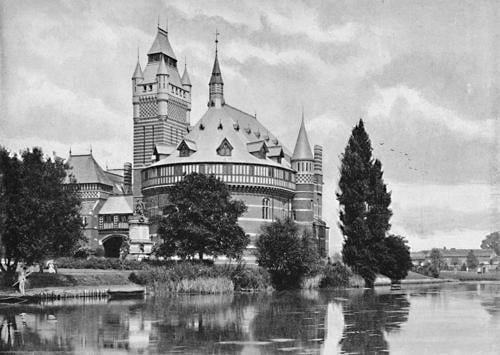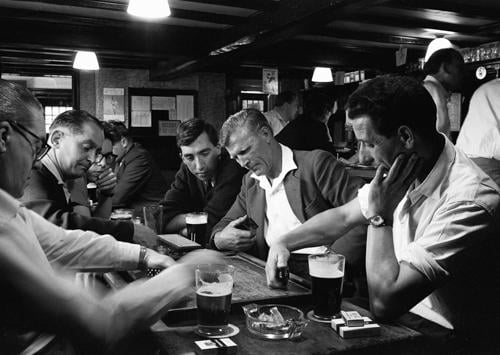Listen to New Voices on Studs Terkel our partnership with 826CHI-here! Read the Story
Showing 1 - 15 of 78 results
-
Two Welshmen, an Englishman and housewife talk to Studs Terkel ; part 2
1968 While on a trip to England, Terkel interviews housewife Ann Davis. This is an interview done in two parts.
-
Two Welshmen, an Englishman and housewife talk to Studs Terkel ; part 1
1968 While in England, Terkel attended a Rugby match in Wales. While at the match, he interviewed four people: two Welshman, an Englishman, and housewife. One of the people he interviewed is named David Thomson.
-
Tommy Titmus and residents of West Ham Old People's home discuss the British Depression
Sep. 30, 1970 Police officer Tommy Titmus recalls what it was like when people marched and protested at Clerkenwell Green. Titmus said the people marching resembled a rejected lot. Their marching had a purpose, explained Titmus, to demonstrate their plight to the queen. Residents of West Ham Old People's Home all agreed when people speak of the "Good Old Days," that there is no such thing. Jim Field, 79, Ted Blurton, 77, Mrs. MacClaine, 82, and Mrs. Mansfield, 69, said there were no jobs and there was no food. Mr. Field had to sell his pet canary to obtain money to get food.
-
The very "U" girl talks with Studs Terkel ; part 2
1962 Interviewing with the very "u" girl at the establishment (Part 2) while Studs was in England.
-
The very "U" girl talks with Studs Terkel ; part 1
1962 Interviewing with the very "Upper U" girl at the establishment (Part 1) while Studs was in England.
-
Terkel comments and Ronald Blythe reads Report from an English village ; part 2
Sep. 19, 1986 Reading "Report from an English Village" and interviewing the author Ronald Blythe while Studs was in London.
-
Studs Terkel in Stratford-Upon-Avon. At the National Theatre and at the Falcon Hotel ; part 1
1962 Studs Terkel heads to the British town of Stratford-upon-Avon (the birthplace of William Shakespeare) intending to interview Sir John Gielgud, and getting a few words before Studs realizes that Sir John is not intending to be interviewed. He speaks instead to other members of the company. Then he meets Mr. and Mrs. Lawrence in the Falcon Hotel.
-
Studs Terkel comments about London and random interviews
1968 A compilation of interviews recorded in Britain discussing life, culture, and customs in Britain, part 1.
-
Studs speaks with patrons at Mr. and Mrs' Lawrence's pub in the British Midlands near Stratford-upon-Avon
1962 Studs interviews patrons in a the pub of the Falcon Hotel, owned by Mr. and Mrs. Lawrence, while in Stratford-upon-Avon (Midlands) in England. A variety of questions were asked about favorite memories, jobs, and daily life.
-
Sir George Bolton of Bank of London discusses British economic depression
Sep. 23, 1970 Sir George Bolton discusses how the 1929 American stock market crash affected international banking and investment and how economy and culture relate to each other.
-
Sally Trench discusses her book “Bury Me in My Boots” ; part 2
1968 Humanitarian and author Sally Trench discusses her book “Bury Me in My Boots,” her work with the homeless communities in England, her journeys, and her belief in self-help with Studs Terkel. Both Trench and Terkel read an excerpt from Trench’s book “Bury Me in My Boots.”
-
Sally Trench discusses her book “Bury Me in My Boots” ; part 1
1968 Humanitarian and author Sally Trench discusses her book “Bury Me in My Boots,” her work with the homeless communities in England, her journeys, and her belief in self-help with Studs Terkel. Terkel reads an excerpt from Trench’s book “Bury Me in My Boots.”
-
Ronald Blythe discusses the village of Akenfield ; part 1
1968 Ninety five miles outside of London, Ronald Blythe has interviewed residents of the village of Akenfield for his next book, "Akenfield: A Portrait of an English Village." Blythe said what surprised him most of all was that newspapers and TV didn't have much effect on this little village. Blythe also learned that the village people would take part in political conversations with one another but they'd never let on as to which political party they were apart of.
-
Robert Morley discusses the youth and Kenneth Allsop discusses people from his book
1962 Robert Morley, stage and screen actor, starring in Ustinov's "Halfway Up the Tree," discusses education, technology and youth and the changes in the social makeup because of technology.




